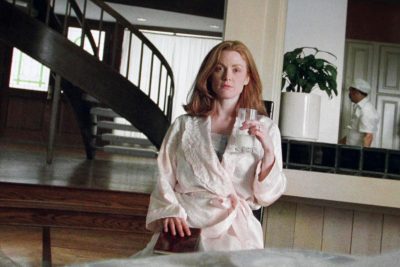Venturing to the movie theater has been a key feature of life since the first big screen was first unveiled. But now — with the increased popularity of streaming services on top of the pandemic-induced closures — how people watch films is completely different.

Boston University’s Cinema and Media Studies program is hosting the series “Pandemic Cinema” throughout the Spring semester, focused around the idea of movie-watching during COVID-19.
The series held a virtual conversation Tuesday on Todd Haynes’s “Safe” — a 1995 horror drama starring Julianne Moore, an alumna of BU’s College of Fine Arts.
Jonathan Foltz, the director of the BU cinema and media studies program, is the host of BU’s online Zoom series “Pandemic Cinema.”
The series features films encapsulating the “ideas of illness, of contagion, of isolation” and what people are going through now, he said.
In an interview, Foltz said the event provides a space for students and faculty to watch and discuss movies outside of the classroom to bond through the pandemic. But gathering on “the sort of degraded, depressing Zoom” in this capacity, he said, also begs the question of what cinema will look like in the future.
“[The pandemic] sort of has the appearance of finalizing a cultural transition that was already long underway.” Foltz said. “Will going to the movies look different? Will it feel different?”
The online series is also designed as a way to “to help alleviate the stress and solitude” of life during the pandemic, Foltz said, even though they cannot meet in person.
“There’s this attempt to band together to really appeal to that communal aspect of film going, which is one of the things that we’ve lost in not being able to go see films in theaters,” he said. “That kind of collective group experience is harder to find these days.”
The first film of the series this Spring was titled “The Seventh Seal,” which takes place during the Crusades and follows people who are coping with exposure to the Plague.
In “Safe,” Moore plays an affluent suburban Los Angeles housewife, who suddenly becomes sick with an unexplainable illness, caused by toxicity in her environment.
The mysteriousness of her illness and her doctors’ and loved ones’ denial makes the character question her mental sanity.
At the event, attendees unpacked the character’s story in relation to the greater HIV/AIDS epidemic dominating the national dialogue when the film was released. The film is considered to be a commentary on the United States’ paranoia with HIV and AIDS in the ’80s, and perhaps takes on new meaning given not only the continued prevalence of HIV/AIDS globally, but the worldwide spread of the novel coronavirus today.
Attendees also unpacked specific scenes from the film and her character herself. Others also brought up the themes of the movie as a whole, such as the importance of asking “why” and being self aware in a bubbled environment.
Foltz said he himself was very intrigued by the movie when he first watched it because of the comedic and disturbing elements in it.
“I just remember being blown away by how unsettling the film is and how the filmmaker sort of gets under your skin and causes this really profound and interesting discomfort in the viewer,” he said. “Not knowing how to feel about something, I think is really interesting.”
College of General Studies sophomore Mehreen Kamal, a self proclaimed “movie-buff,” said she understands the importance of in-person screenings.
“It was like, when the pandemic hit, a huge change … as someone who’s so used to the theater-going experience,” she said. “Especially with [Learn from Anywhere], I think it’s just one of the things that I’ve been doing the most to keep myself entertained or even stay connected with friends.”
A remote student in Virginia, Kamal said she has “been trying to seek alternatives,” such as a drive-in theater and Netflix watch parties with friends to make up for the loss of the big screen and to stay connected.
For Kamal, however, she said the movie-going experience can’t be replicated on a computer screen. In the meantime, though, she said it’s a great way to power through a difficult time.
“The movie-going experience is mostly just about the art for me in a lot of ways,” she said. “At home, it’s more about connecting with people. It’s a whole different feeling.”


























































































































